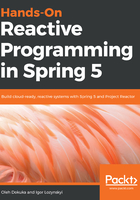
Ratpack improvements
Along with Vert.x, another well-known web framework called Ratpack also provides support for Reactive Streams. In contrast to Vert.x, Ratpack offers direct support for Reactive Streams. For example, sending streams of logs in a Ratpack case looks like the following:
RatpackServer.start(server -> // (1)
server.handlers(chain -> //
chain.all(ctx -> { //
Publisher<String> logs = logsService.stream(); // (2)
ServerSentEvents events = serverSentEvents( // (3)
logs, //
event -> event.id(Objects::toString) // (3.1)
.event("log") //
.data(Function.identity()) //
); //
ctx.render(events); // (4)
})
)
);
The key is as follows:
- This is the server start's action and request handler declaration.
- This is the logs stream declaration.
- This is the ServerSentEvents preparation. Here, the mentioned class plays a role in the mapping stage which converts the elements in the Publisher to the Server-Sent Events' representative. As we may have noticed, ServerSentEvents mandates the mapper function declaration, which describes how to map an element to the particular Event's fields.
- This is the rendering of the stream to I/O.
As we may see from the example, Ratpack provides the support for Reactive Streams in the core. Now, the same LogService#stream method may be reused without providing an additional type conversion or a requirement for the additional modules to add support for the particular reactive library.
Moreover, in contrast to Vert.x, which provides just plain support of the Reactive Streams specification, Ratpack provides its own implementation of the interfaces of the specification. This functionality is available within the ratpack.stream.Streams class, which is similar to RxJava API:
Publisher<String> logs = logsService.stream();
TransformablePublisher publisher = Streams
.transformable(logs)
.filter(this::filterUsersSensitiveLogs)
.map(this::escape);
Here, the Ratpack offers a static factory to convert any Publisher to TransformablePublisher, which in turn gives the ability to flexibly process a stream of events using familiar operators and transformational stages.